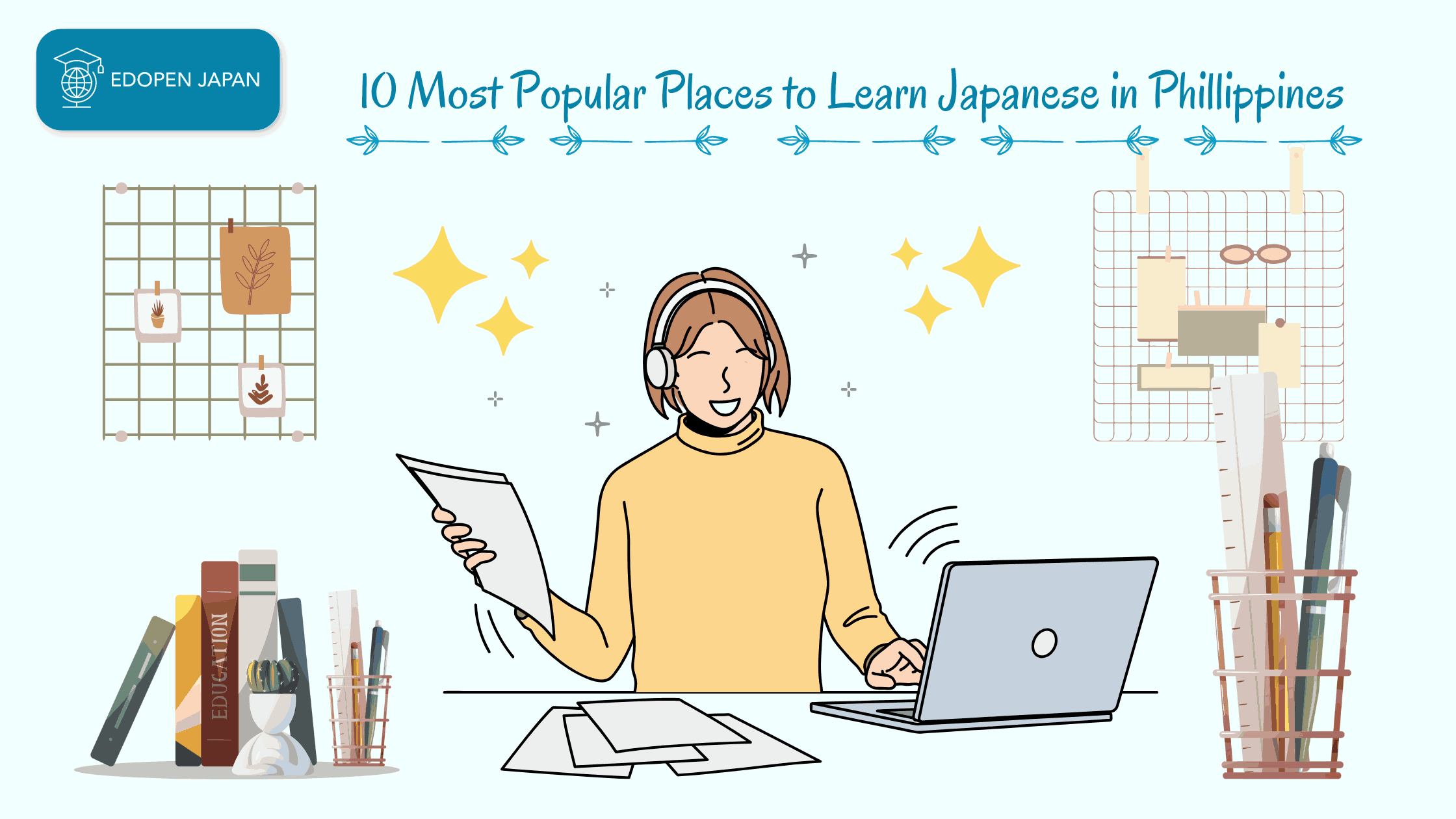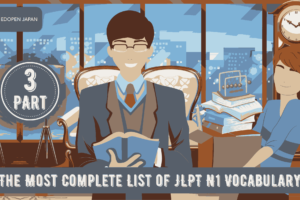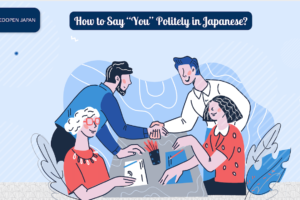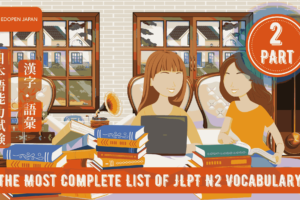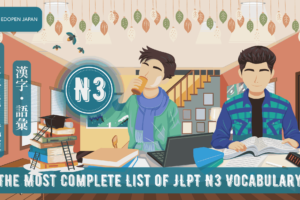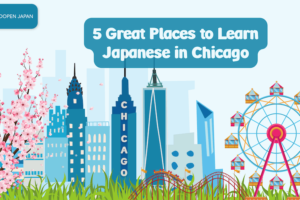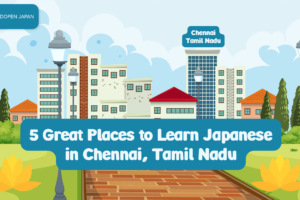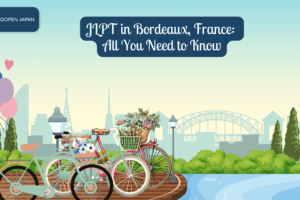Are you currently looking for the best place to learn Japanese in the Phillippines? Do you find it difficult to find the best Japanese language course in the Phillippines? Do you also want to work in a Japanese company and having fluency in Japanese is something you really need? We are here to help you solve this challenge.
Especially for you, we have compiled the following best 10 places that have become the best and most trusted Japanese language learning centers in the Philippines. Of course, at very affordable prices.
Plus, with a long history and a growing system, these 10 places also provide a wide range of excellent programs that are very useful for you in understanding the Japanese language and culture. These 10 places should definitely be on your list.
Additionally, we have information on JLPT and other Japanese language schools in Southeast Asia. At the end, please review the information on finding the best Japanese tutors. This is an ideal option for those with limited time. All necessary information is provided here. Let’s begin!
Read also:
10 Great Places to Learn Japanese Singapore
5 Best Places to Learn Japanese in Malaysia
Contents
About Philippines
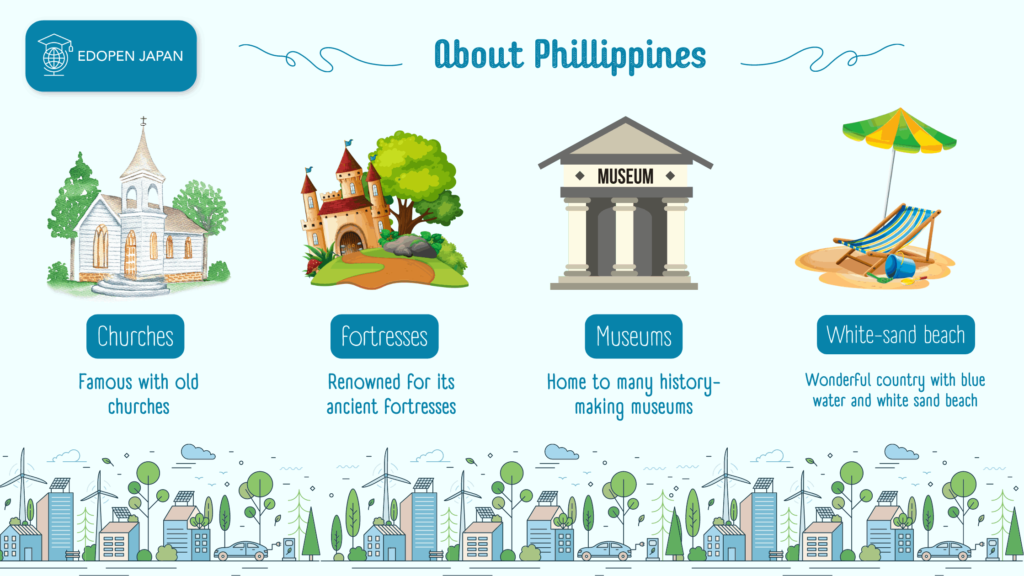
An authentic country known for its old churches, ancient fortresses, and history-making museums, the Philippines is one of Southeast Asia’s richest tourist destinations. Not only that, its blue water beaches filled with white sand, coral, and foliage are very beautiful, and the country also has a strong appeal in tourism.
Filipinos are known to be very warm and friendly. Most of them are also very fluent in English. Their hospitality unsurprisingly makes travelers feel very welcome. In the capital city of the Philippines, the beautiful city of Manila, a lot of skilled laborers gather and drive the Philippine economy very well. In addition, various international events have also been held in this country with very comfortable climatic conditions.
In addition, its well-equipped shopping malls, restaurants with international-class service, and its various historical and cultural heritage shows make Manila always have a special place in the hearts of foreign travelers.
With its strategic location in Asia, Manila is also one of Asia’s busiest transit points for international flights. Hence, the Philippines is also known to have excellent international relations with other Asian countries. Japan included.
Many Filipino professionals have built great careers in Japan. Japanese language learning centers in the Philippines are also growing. Many of them fly to Japan for higher education and then return home to build the Philippines. Not a few have also become bridges between the two countries in the fields of business, industry, education, and many other sectors.
10 Most Popular Places to Learn Japanese in Philippines
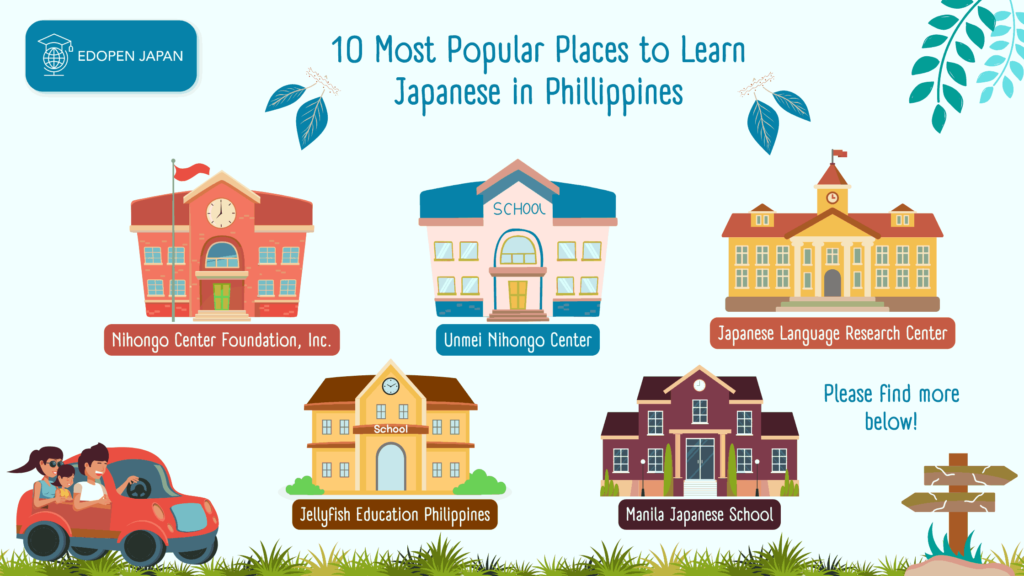
Here are the 10 most popular places to learn Japanese in Philippines. Hope you find what you need and looking for!
1. Nihongo Center Foundation, Inc.
Nihongo Center Foundation (NCF) was established in 1969 and has 2 office branches (Manila and Makati branch) as a tangible contribution to support good relations between Japan and the Philippines through the Japanese language and to prepare local Filipino teachers who want to pursue a career as a Japanese language teacher.
In addition, NCF has an excellent program continuously improves the process of teaching Japanese to be more effective and efficient for students by emphasizing communication skills at the beginning for students and partnerships with Japanese companies directly. The following are the course:
| Courses | Details |
| 1. Basic Japanese Courses (1-5 levels) | Preparation for JLPT N5 and N4 |
| 2. Intermediate Japanese (1-6 levels) | Preparation for JLPT N3 and N2 |
| 3. Conversational Japanese (1-2 levels) | Learning special topics to acquire practical communication skills |
| 4. Special Courses (One-on-One Tutorials, JLPT Exams Review Classes, Translation Course, and Business Japanese) | Special courses to pass the highest level N1 |
In its development, NCF has expanded its services by opening all levels of Japanese, JLPT preparation classes from N5-N1 as well as Japanese translation and interpretation services for corporations. NCF itself already has very adequate supporting facilities in improving the Japanese language learning process.
Then, one of which is a very large dormitory that can accommodate approximately 200 students where this dormitory can also be used as a place for various language and cultural exchange events.
Address: 825 Ricardo Papa Street, Sampaloc, Manila-1008 (Manila Branch) and 6th Floor, Electra House Building, 117 Esteban Street corner Rufino Street, Legaspi Village, Makati City-1229 (Makati Branch)
Recruitment Term: Every Month
Number of Instructors: 11
Capacity: 600 students/year
2. Unmei Nihongo Center
If you want to see how many partnerships with major Japanese and Filipino companies and awards a Japanese language school has received, Unmei Nihonggo center is one of the tops. Unmei was established in 2009 and has grown rapidly with 3 branches in Ortigas, San Pablo, Cubao, and Cebu.
27 world-class companies have cooperated and used the services of this Japanese language school, and awards from 2012-2019 a series of awards summarized as “the best Japanese language school in the Philippines” is a guarantee if you choose the school as your best place to learn Japanese.
| Courses | Details |
| 1. JLPT N5 Course | Intensive course to make students ready to take JLPT N5 |
| 2. JLPT N4 Course | Intensive course to make students ready to take JLPT N4 |
| 3. JLPT N3 Course | Intensive course to make students ready to take JLPT N3 |
| 4. JLPT N2 Course | Intensive course to make students ready to take JLPT N5 |
In addition, the following above 90% satisfaction survey scores consist of excellent teachers, conducive facilities, best study tools, and a high percentage of passing the JLPT test. This is indisputable proof that this language school is the top choice of students in the Philippines.
Moreover, Unmei also provides conversation-only courses for students who just want to improve their conversation. The language of instruction is Tagalog or English for foreign students who want to learn Japanese. Furthermore, Unmei already provides Japanese translation and interpretation services. Classes can be held throughout the day, on weekdays, or on weekends. Then, the classes start from 9 am to 4 pm.
Address: Unit 1204 One Magnificent-Mile Bldg., San Miguel Ave., Ortigas Center, Pasig City 1605 (Main Branch)
Recruitment Term: All Seasons
Number of Instructors: –
Capacity: –
3. Japanese Language Research Center (JLRC)
The Japanese Language Research Center (JLRC) was founded in 2001 by alumni from a Philippine university who had done a study exchange to Japan. With the motto “Less Time, Less Cost and Less Effort”, the school provides Japanese language training services to students with guaranteed quality but at an affordable price.
Additionally, one of JLRC’s advantages is that most of the teachers hired are graduates from reputable universities (Philippine universities). Only 10% of the total applicants qualified to become teachers. The classes used are also confirmed by the management team for the appropriateness of the equipment and supporting facilities.
Furthermore, you can choose your schedule according to the comfort level of your busy schedule, offered on weekdays and weekends, with morning, afternoon, and evening time slots. The following are the available courses:
| Courses | Details |
| 1. JLPT Courses (N5 to N2) | Very compact courses to cover basic to advanced level |
| 2. 1-on-1 Tutorials (Intensive Oral, Intensive Oral with Writing, JLRC Kids) | Very flexible courses |
| 3. Other Courses (TESDA Course, Corporate Classes) | – |
In particular, JLRC has a High JLPT pass rate with a money-back guarantee if you fail to pass JLPT N5 and N4. With a note that students must meet 90% class attendance. Likewise, if you are not satisfied with the JLRC course you can ask for your money back without questioning the reason!
Furthermore, JLRC has Original and High-Quality Materials and a well-designed syllabus to guarantee and support the acceleration of students in learning the Japanese language both in theory and speaking practice.
Address: Unit 506 City land Shaw Tower, Shaw Blvd, Mandaluyong, 1552 Metro Manila, Philippines
Recruitment Term: Anytime
Number of Instructors: >5
Capacity: Small Group
4. Jellyfish Education Philippines
Jellyfish Education Philippines (JEP) was established in 2007. The school was originally an internet provider company and developed into a service provider in the field of improving the quality of education in the Philippines.
Moreover, especially being a bridge between Japan and the Philippines. JEP has now expanded to neighboring countries (Vietnam and Indonesia) with the hope of opening employment opportunities and helping young people in Southeast Asian countries to speak Japanese.
Additionally, with a special curriculum designed by the JEP team, students will not find it difficult to absorb the subjects, reviews from several alumni say that JEP is the perfect place for those who want to learn Japanese or for those who want to experience learning and even working directly in Japan.
| Courses | Details |
| 1. JLPT N4 Levels | Complete the course for level N4 by listening and speaking as well as by interaction |
| 2. JLPT N5 Levels | Complete the course for level N5 by listening and speaking as well as by interaction |
Please note that, once you register, the team from this school will be very supportive of you in terms of taking care of documents, especially the team will try to make you feel like studying and working in Japan, one of the reasons is that JEP cooperates a lot with school institutions in Japan, making it easier for you who want to exchange both culture and education.
Address: Unit 902A Philippine Stock Exchange Center East Tower Exchange Road, Ortigas Center, Pasig City 1605
Recruitment Term: Anytime
Number of Instructors: –
Capacity: Group or Private
5. Manila Japanese School
This school is one of the oldest, started before World War II. In 1917 it was established by establishing an elementary school for Japanese children who lived in Manila. The school is well prepared to teach Japanese by equipping excellent educational facilities.
In particular, the facilities were 50-inch electronic whiteboards, cameras in each classroom, internet infrastructure to welcome the new era of online teaching, and each student is given an iPad and Chromebook for junior high students.
In addition to teaching Japanese, the school also teaches English, and swimming lessons, as well as training and mentoring for students who want to work both in the Philippines and Japan.
This school is very classy, especially for children, they will be comfortable, enjoyable, and carefree learning Japanese here and children will also be able to learn about the culture between Japan and the Philippines.
Address: University Park, Bonifacio Global City, Taguig, Metro Manila, Philippines
Recruitment Term: Anytime
Number of Instructors: –
Capacity: 220 students/year
6. Hanasu Japanese Learning Center
If you are pursuing fluency for JLPT levels N5 and N4, consider registering for Japanese language classes at the Hanasu Japanese Learning Center. Their courses focus on providing high-quality Japanese language education and even include videos to aid in understanding the material.
This Hanasu Japanese Learning center offers a range of learning materials tailored to help students achieve proficiency at N5 and N4 levels. These materials ensure success in passing these two levels.
Available classes include basic Japanese, pre-intermediate Japanese, and online classes that focus on mastering JLPT N5 and N4 material.
Address: Blk 10 Lot 2 Tengao St cor Flores De Mayo St Greater Lagro 1100 Quezon City, Philippines
Recruitment Term: Anytime
Number of Instructors: –
Capacity: small group
7. Gengo Kenshu Center
If you are seeking a fundamental understanding of Japanese culture and ethics, you may enroll in the Japanese language courses offered by the Gengo Kenshu Center. Established in 2014, the Gengo Kenshu Center is a non-profit organization that offers two types of courses: basic Japanese classes totaling 320 hours and Japanese language, cross-cultural, and ethics classes totaling 480 hours.
In basic Japanese classes, you will learn Japanese characters and how to communicate effectively in everyday situations. In the cross-cultural and ethical Japanese language class, you will study various materials that enhance your understanding of Japanese culture and ethics.
Address: Unit 301 T.U Square Building B.S. Aquino Drive, Corner Lacson Street, Bacolod, 6100 Negros Occidental, Philippines
Recruitment Term: Check the website for details
Number of Instructors: –
Capacity: small group
8. The Japan Foundation, Manila
The Japan Foundation is an official institution supervised by the Ministry of Foreign Affairs. Established in 1996, the Japan Foundation, Manila (JFM) is active in three areas: Arts and Cultural Exchange, Japanese Language Education and Japanese Studies, and Intellectual Exchange.
In addition, JFM offers an effective online Japanese course called Irodori Japanese for life in Japan, which is useful for Japanese language learners.In addition, this institution offers official courses designed for students.
To register for Japanese language learning programs available at Japan Foundation Manila, simply check the latest information on their official website below.
Address: 23/F Pacific Star Building, Sen. Gil Puyat Avenue corner Makati Avenue, Makati City, 1226 Philippines
Recruitment Term: Check the website for details
Number of Instructors: –
Capacity: Check the announcement for details
9. Hikari Japanese Learning Center
Hikari Japanese Learning Center was established in 2016 by Villy Joe Marzon and Melanie Marzon to assist job seekers in the Philippines to compete and work in Japan. The center offers a range of basic to advanced Japanese language classes, including Japanese language training, working visa program, and student visa program.
For the Japanese language training program, Hikari offers a 4-month intensive course taught by professional instructors. The course utilizes innovative methods, techniques, and learning resources.
Address: D1 GF JM Bldg., Arguelles St., San Francisco, Panabo City, 8105 (Head Office)
Recruitment Term: Check the website for details
Number of Instructors: –
Capacity: Check the announcement for details
10. One World Japanese Language Center, Inc
One World offers specialized Japanese language classes for Filipinos who are going to work in Japan, particularly as nurses.
The program not only teaches Japanese language but also provides an understanding of Japanese culture and customs, facilitating an easier adaptation to the Japanese lifestyle.
The program lasts for 160 hours over one month and covers hiragana, katakana, greetings, and various everyday conversations.
Additionally, One World offers a four-year nursing course. This course provides technical internship training for nursing, which has been available since 2017.
Address: 15A, Atherton Place, 1 Tomas Morato, corner Roces Avenue, Barangay Laging Handa, Quezon City, Philippines 1103
Recruitment Term: Check the website for details
Number of Instructors: –
Capacity: Check the announcement for details
How to Find the Best Japanese Language Tutors in the Philippines?
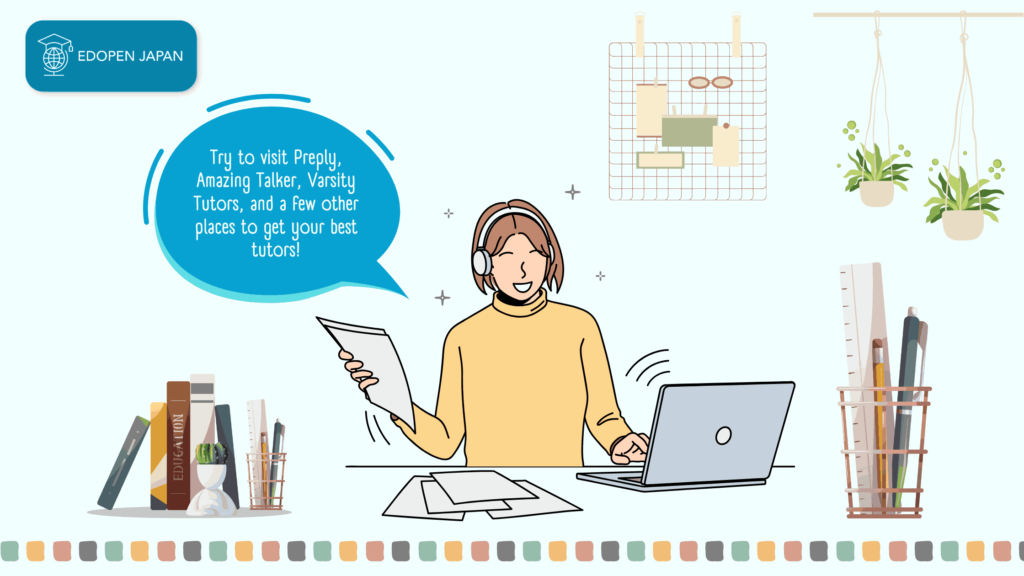
These are the 10 places we highly recommend for learning Japanese in the Philippines. Additionally, for those with limited time, there is an option to learn from native Japanese speakers in the Philippines.
Based on ratings and alumni, you can find the best tutors to help you from scratch. To find the best Japanese tutors in the Philippines, we recommend searching on Preply, Amazing Talker, Varsity Tutors, and other reputable platforms.
We are also available to assist you in your journey to master Japanese. Remember to follow the comprehensive and reliable information we have provided. Our goal is to provide you with the resources to pass the highest level JLPT in the Philippines!
Looking for More Information about Learning Japanese in Philippines?
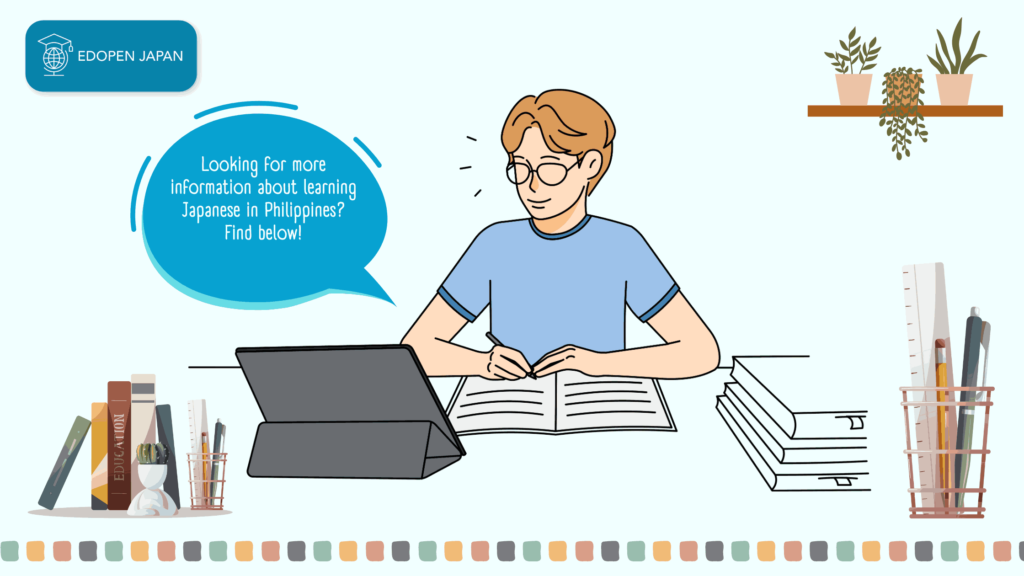
- Is Japanese easy to learn for Filipino speakers?
With dedication, effort, and perseverance, the differences in language structure, writing systems, and pronunciation between Japanese and Filipino will not hinder your ability to speak fluent Japanese. - Are there online Japanese classes in the Philippines?
There are numerous Japanese language schools in the Philippines that provide online Japanese classes that can be taken from anywhere. - How many years does it take to learn Japanese fluently?
According to experts, achieving fluency in Japanese comparable to that of a native speaker typically takes at least three years. However, with more intensive and diligent study, you can attain Japanese fluency more quickly. - How many months to study Nihongo in Philippines?
The duration of time provided by each school in the Philippines varies greatly. However, a basic Japanese language program typically takes 3 months. Please refer to the detailed information on Japanese language schools that we have shared above. - Is 2 Years enough to learn Japanese?
Experts suggest that achieving fluency in Japanese typically takes around three years. However, with dedicated study and practice, it is possible to reach fluency within two years. - What’s the hardest language to learn?
Japanese is considered one of the most challenging languages for native English speakers to master. - What is the most efficient way to learn Japanese?
Please read this more thoroughly: 10 Steps How to Learn Japanese for Beginners, How Long Does It Take to Be Fluent in Japanese? and 10 Great Tips for Learning Japanese Fast. - Where should I start if I want to learn Japanese?
To begin learning Japanese, it is essential to master hiragana. Hiragana is crucial for understanding vocabulary, grammar, and kanji in Japanese. - Should I learn hiragana or katakana first?
Learn hiragana first because it is essential to master before moving on to kanji. - Should I learn Japanese if I want to visit Japan?
Having a basic understanding of Japanese before visiting Japan can be extremely helpful. It can assist you in various urgent situations, such as asking for directions when lost, reporting lost items to the police, or in other emergency situations.
Conclusion
These are the top 10 places in the Philippines that we highly recommend for learning Japanese. Have you studied at any of these locations? Please share your experience with us below.
| School Name | Courses |
| 1. Nihongo Center Foundation, Inc. | Basic, Intermediate, Conversational and Special Courses |
| 2. Unmei Nihongo Center | JLPT N5 to N2 Preparation |
| 3. Japanese Language Research Center | JLPT Preparation, 1-on-1 Tutorials, and Others |
| 4. Jellyfish Education Philippines | JLPT N4 and N5 Preparation |
| 5. Manila Japanese School | Special Course for Children |
| 6. Hanasu Japanese Learning Center | JLPT N5 and N4 Preparation |
| 7. Gengo Kenshu Center | Basic Japanese & Japanese language, cross-cultural, and ethics |
| 8. The Japan Foundation, Manila | Online Japanese Course |
| 9. Hikari Japanese Learning Center | Japanese Language Training, Working Visa Program, and Student Visa Program |
| 10. One World Japanese Language Center, Inc | Basic Japanese & Technical Internship Training for Nursing with Japanese Preparation |
We hope this information will help you find the best Japanese language learning places in the Philippines. Please feel free to contact us if you need more information about learning Japanese. Thank you for reading! Have a great day and keep up the good work in learning Japanese.

